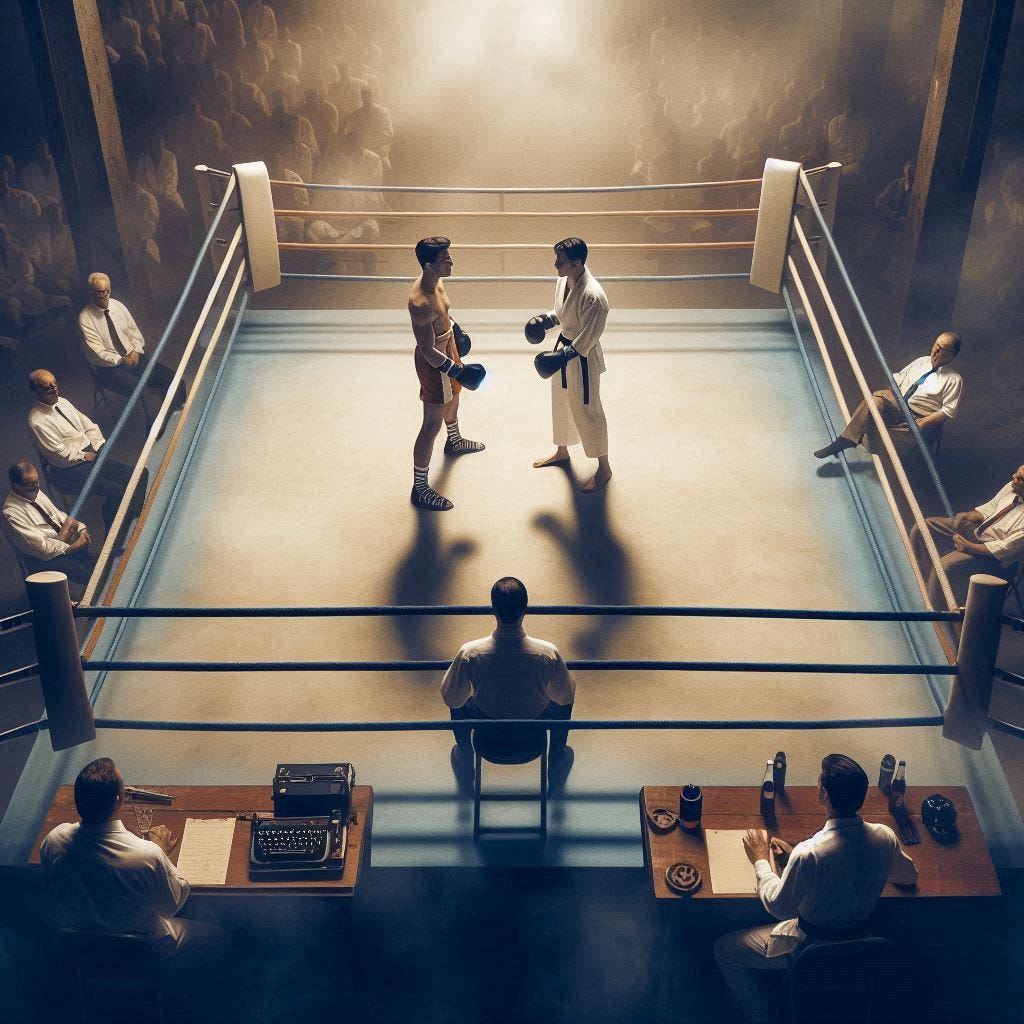Do you have to abandon your style to win a match?
Do you throw away everything you have learned just to come out top in a slugging match?
This has been churning around in my head for a long time.
Years back I remember a magazine interview with a Western Tai Chi stylist who was recounting how he won an Asian ‘open’ full contact match many decades back, with the suggestion being that he fought his way to the top using his Tai Chi training. But, something didn’t quite sit right. There were a couple of still photos in the article that showed him wearing old fashioned, huge leather boxing gloves, like something from the 1940’s. Somehow, I couldn’t square Tai Chi with that way of operating. Maybe I was wrong in assuming so much on so little evidence?
Then, more recently came the new form Karate Combat, in which well-known points fighters used to WKF rules seemed to completely change their style to suit the format (which is understandable to a degree). But most noticeably, not only did the guard rise to almost solely protect the head, but all the energy generation also rose up into the shoulders. The punching just went wild (something that a good boxer would have really punished). These were haymakers that sometimes went so far past the target that the perpetrator was often knocking himself off balance.
To my mind, some of strengths of good karate is that power is created through the smallest of movement. People spend years trying to find a kind of explosiveness that doesn’t rely on a huge wind-up, and to create a skill-set where their footwork and body angling puts them in a great position to really capitalise on the opponent’s mistakes. But that’s just my opinion.
Example from Chinese Kung Fu.
Then, this came on to my radar:
I tried to find more info on this grudge match/duel between two Chinese masters in 1954 in Macau. The comments underneath said that the participants were; “White Crane representative Chen Ke Fu (陈克夫 or Chan Hakfu) and Wu Tai Chi representative Wu Gong Yi (吴公仪). Both were headmasters of their respective schools.”
I watched it several times trying to see something that would give them the benefit of the doubt. Was I perhaps missing something? Is this truly White Crane (the forerunner of Okinawan karate)? Or do I call it what I think it is; two guys having a desperate scrap, like you might see outside a bar on a Friday night? I see no hint at ‘mastery’, unless I dramatically misunderstand what ‘mastery’ actually means. All that windmilling and bottom kicking, then losing your balance and getting caught up in the ropes looks too much like slapstick comedy.
But it was 1954. I do find myself wondering if the information given in the YouTube page is actually verifiable though. I don’t take anything on the Internet these days at face value.
Does it always have to be like that?
In the early days of UFC there were ‘stylists’ who thought they’d ‘have a go’ and it always ended up badly. Whatever you think of the UFC and its embryonic origins; whether you believe it was rigged in the favour of the Gracie’s, or whatever, it did shine a window on all forms of martial arts activities and excited the interest in the flagging martial arts market place.
In addition, every match of ‘this style versus that style’ on YouTube and other media ends up as a massive disappointment; usually because the people involved are not solid representatives of what their style can produce. And besides, it’s a bit like how people with serious scientific credentials NEVER debate on forums on the Internet. The greater the expert you are in your field the less inclined you are to duke it out with people who have much much lesser knowledge, why waste your time? Just stay in the fast lane of what you do. For example; scientific experts in climate change do not engage in Internet forum punch-ups with climate change denying trolls.
Comparisons with music.
One line of thought is; ‘don’t blame the music, blame the musician’. To extend the metaphor; each martial arts practitioner is both the musician and the instrument. They work with the music as it is presented to them. It might be a piece written by Mozart, or something more contemporary, maybe penned by jazz musician Wayne Shorter. If the musician’s level of expertise is of a low standard, they are not going to represent the music well.
How many of us are likely to live in the world of Lenny McLean and Roy ‘Pretty Boy’ Shaw?
Before people jump up and down and proclaim that empty handed martial arts should be able to deal with all-comers; consider these guys.
These were, late 20th century heavyweight English bruisers who engaged in a series of ‘unlicenced’ grudge matches; not pretty to watch.
Roy Shaw and Lenny McLean fought three times in the 1970’s, for the title of ‘The Guv’nor’ (Lenny is also remember for his role in the Guy Ritchie movie, ‘Lock, Stock and Two Smoking barrels’, as ‘Barry the Baptist’). The result was 2-1 in favour of Lenny McLean.
Here is one of the cleaner videos of a McLean/Shaw fight. Watch closely and you will see Lenny trying to stamp on his opponent’s head:
Conclusion.
The more you dig into this the more complicated in becomes. Never mind the ‘what-ifs’ in the debate, the ground is always shifting under your feet. And, finally, you have to ask the very fundamental question; why would you want to engage either in a debate or a face-to-face encounter to find out whether ‘my dad is bigger than your dad’?




